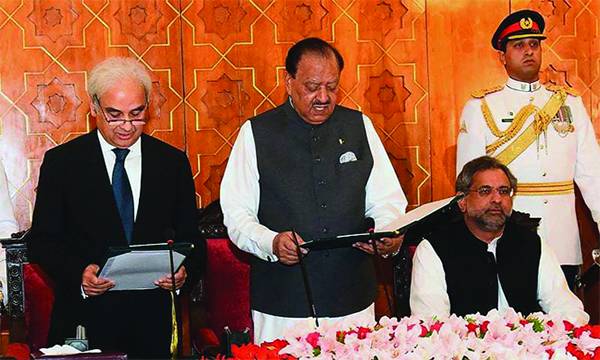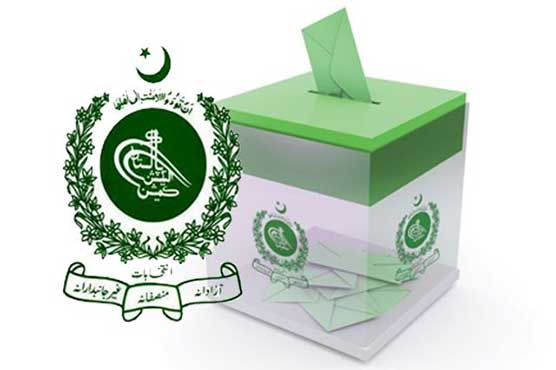
Uncertainty is looming over the fate of the general elections in Pakistan which are due on July 25, after a resolution seeking a one-month delay was passed in Balochistan Assembly, followed by a Judgment from Islamabad High Court on delimitations of constituencies.
Despite these uncertainties, National Assembly (NA), the Punjab and the Balochistan assemblies were dissolved on June 1, after completing their five-year terms. A notification about the dissolution of the National Assembly was issued by its Joint Secretary that the NA stood dissolved on May 31, 2018.
Earlier, the assemblies of Sindh and the Khyber Pakhtunkhwa had also completed their respective terms and stood dissolved. Justice (r) Nasirul Mulk has been nominated as the caretaker prime minister with consensus between former prime minister Shahid Khaqan Abbasi and leader of the opposition in National Assembly Syed Khursheed Shah.
Article 52 of the Constitution says that the National Assembly, unless dissolved sooner, can continue for a term of five years from the day of its first meeting and shall be dissolved on the expiry of its five-year term. Corresponding Article 107 states that provincial assemblies are also bound to dissolve on completion of their terms.
Once the National Assembly is dissolved, the president of Pakistan and in case of provinces, the governor, has to appoint a caretaker cabinet. The president must appoint the caretaker prime minister after consultation with the prime minister and the leader of opposition of the outgoing assembly. Governors must appoint caretaker chief ministers after consultation with the outgoing chief minister and leader of the opposition.
If the prime minister and leader of the opposition fail to reach consensus over name of the caretaker prime minister, then the matter is referred to a parliamentary committee comprising of equal number of members from both outgoing government and opposition. If this committee fails to reach consensus, then the Election Commission of Pakistan reserves the right to appoint caretaker prime minister for a certain time period. Similar referrals are made in case of failure in reaching consensus over the provincial caretaker set up.

According to Section 230 of the Election Act 2017, a caretaker set up shall attend to day-to-day matters which are necessary to run the affairs of the government, assist the ECP to hold elections in accordance with law and restrict itself to activities that are of routine, non-controversial and urgent nature, in public interest. These are reversible by future governments elected after the elections. They are required be impartial to every person and political party.
According to the law, a caretaker government shall not take major policy decisions except on urgent matters, take any decision or make a policy that may have effect or pre-empt the exercise of authority by the future elected government, enter into major contract or undertaking if it is detrimental to public interest or enter into major international negotiation with any foreign country or international agency or sign or ratify any international binding instrument except in an exceptional case. It cannot make promotions or major appointments of public officials but may make acting or short-term appointments. A caretaker government cannot transfer public officials unless it is considered expedient and after approval of the commission and attempt to influence the elections or do anything which may adversely affect the process.
Former chief justice Nasirul Mulk has taken oath as caretaker prime minister. He is called an ‘English judge,’ due to his knack for ‘judicial restraint’ and dislike for ‘judicial activism.’
I called up Ahmed Raza Kasuri, whose generation oversaw the framing of the Constitution as we know it, and asked for his views regarding these matters. He said, “The caretaker government is installed to ensure continuity but this practice of establishing a caretaker set up can only be seen in Pakistan. In the original constitution, there was no provision for a caretaker setup and like every other democracy, once the elections were held one government was supposed to hand over powers to the government elect. Here, in Pakistan, due to a severe trust deficit within the political classes, the a caretaker system had to be conceived in.”
Kasuri also sounded wary of the administrative capabilities of judges, especially the law profession pickups (the ones who are directly inducted in high courts). The judges who usually make it to the top court are direct inductees and in Kasuri’s words, “Law profession pickups aren’t very good administrators.” Commenting on the appointment of a former judge as the chief election commissioner in the past and now the appointment of a former chief justice, Kasuri said, “Nowhere in the world are judges given such assignments. Their job is to write judgments and can never make good administrators. Senior and retired politicians must be given such jobs. This is a failure of Pakistan’s political class they can’t agree on a single veteran politician to hold free and fair elections for them.”
Despite these uncertainties, National Assembly (NA), the Punjab and the Balochistan assemblies were dissolved on June 1, after completing their five-year terms. A notification about the dissolution of the National Assembly was issued by its Joint Secretary that the NA stood dissolved on May 31, 2018.
Earlier, the assemblies of Sindh and the Khyber Pakhtunkhwa had also completed their respective terms and stood dissolved. Justice (r) Nasirul Mulk has been nominated as the caretaker prime minister with consensus between former prime minister Shahid Khaqan Abbasi and leader of the opposition in National Assembly Syed Khursheed Shah.
The caretaker government is installed to ensure continuity but this practice of establishing a caretaker set up can only be seen in Pakistan
Article 52 of the Constitution says that the National Assembly, unless dissolved sooner, can continue for a term of five years from the day of its first meeting and shall be dissolved on the expiry of its five-year term. Corresponding Article 107 states that provincial assemblies are also bound to dissolve on completion of their terms.
Once the National Assembly is dissolved, the president of Pakistan and in case of provinces, the governor, has to appoint a caretaker cabinet. The president must appoint the caretaker prime minister after consultation with the prime minister and the leader of opposition of the outgoing assembly. Governors must appoint caretaker chief ministers after consultation with the outgoing chief minister and leader of the opposition.
If the prime minister and leader of the opposition fail to reach consensus over name of the caretaker prime minister, then the matter is referred to a parliamentary committee comprising of equal number of members from both outgoing government and opposition. If this committee fails to reach consensus, then the Election Commission of Pakistan reserves the right to appoint caretaker prime minister for a certain time period. Similar referrals are made in case of failure in reaching consensus over the provincial caretaker set up.

According to Section 230 of the Election Act 2017, a caretaker set up shall attend to day-to-day matters which are necessary to run the affairs of the government, assist the ECP to hold elections in accordance with law and restrict itself to activities that are of routine, non-controversial and urgent nature, in public interest. These are reversible by future governments elected after the elections. They are required be impartial to every person and political party.
According to the law, a caretaker government shall not take major policy decisions except on urgent matters, take any decision or make a policy that may have effect or pre-empt the exercise of authority by the future elected government, enter into major contract or undertaking if it is detrimental to public interest or enter into major international negotiation with any foreign country or international agency or sign or ratify any international binding instrument except in an exceptional case. It cannot make promotions or major appointments of public officials but may make acting or short-term appointments. A caretaker government cannot transfer public officials unless it is considered expedient and after approval of the commission and attempt to influence the elections or do anything which may adversely affect the process.
Former chief justice Nasirul Mulk has taken oath as caretaker prime minister. He is called an ‘English judge,’ due to his knack for ‘judicial restraint’ and dislike for ‘judicial activism.’
I called up Ahmed Raza Kasuri, whose generation oversaw the framing of the Constitution as we know it, and asked for his views regarding these matters. He said, “The caretaker government is installed to ensure continuity but this practice of establishing a caretaker set up can only be seen in Pakistan. In the original constitution, there was no provision for a caretaker setup and like every other democracy, once the elections were held one government was supposed to hand over powers to the government elect. Here, in Pakistan, due to a severe trust deficit within the political classes, the a caretaker system had to be conceived in.”
Kasuri also sounded wary of the administrative capabilities of judges, especially the law profession pickups (the ones who are directly inducted in high courts). The judges who usually make it to the top court are direct inductees and in Kasuri’s words, “Law profession pickups aren’t very good administrators.” Commenting on the appointment of a former judge as the chief election commissioner in the past and now the appointment of a former chief justice, Kasuri said, “Nowhere in the world are judges given such assignments. Their job is to write judgments and can never make good administrators. Senior and retired politicians must be given such jobs. This is a failure of Pakistan’s political class they can’t agree on a single veteran politician to hold free and fair elections for them.”

